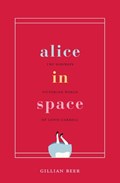The award-winning literary critic takes readers down the rabbit hole of Victorian cultural and intellectual influences on Lewis Carroll’s Alice books.
In Alice’s Adventures in Wonderland and Through the Looking-Glass, Lewis Carroll created fantastic worlds that continue to live in the minds of readers today. Carroll conceived his Alice books during the 1860s, a time of intense intellectual upheaval, as new scientific, linguistic, educational, and mathematical ideas flourished around the world. Alice in Space explores these historic currents, revealing essential context for Carroll’s jokes, concerns, and hidden references.
Parody and Punch, evolutionary debates, philosophical dialogues, educational works for children, math and logic, manners and rituals, dream theory and childhood studies—all fueled the fireworks of Carroll’s restless imagination. In this lively investigation, Gillian Beer convincingly shows him at play in the spaces of Victorian cultural and intellectual life, drawing on then-current controversies, reading prodigiously across many fields, and writing on multiple levels to please both children and adults in different ways.
With a welcome combination of learning and lightness, Beer reminds us that Carroll’s books are essentially about the risks and pleasures of curiosity. Along the way, Alice in Space shares Alice’s exceptional ability to spark curiosity in us, too.

